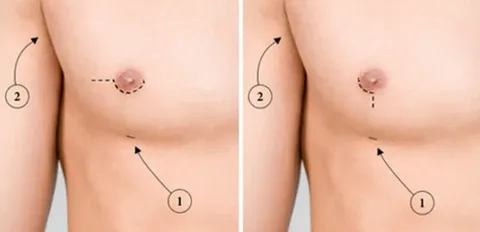How to Tell If You Have Gynecomastia
Worried about changes in your chest area and wondering if it could be something more than just fat? You are not alone. Many men notice puffiness , tenderness , or swelling in their chest and question whether it is fat or a medical issue like You Have Gynecomastia. Let us break it down in a simple , clear way.
Understanding Gynecomastia
Gynecomastia is a condition where the breast tissue in males becomes enlarged. This can happen at any age but is most common during puberty or in older men due to hormonal changes. Its not the same as chest fat. Gynecomastia involves the actual growth of glandular tissue , not just fatty buildup.

The most common signs of gynecomastia include swelling around the nipples , tenderness , and a firmer chest texture.
What Causes Gynecomastia?
The main cause of gynecomastia is an imbalance between estrogen and testosterone. When estrogen (a hormone that promotes breast growth) is too high , or testosterone is too low , it can lead to enlarged breasts in men.
Other triggers include certain medications , alcohol or drug use , liver or kidney disease , and even stress. Some men may develop gynecomastia temporarily , especially during puberty.
Difference Between Fat and Gynecomastia
It can be tricky to tell if you are dealing with gynecomastia or just excess chest fat from weight gain. Fat usually feels soft and spreads evenly over the chest. Gynecomastia , on the other hand , feels more rubbery or firm and is concentrated around the nipple area.
You might notice tenderness or even pain when touching the chest. This is often a key indicator that the swelling is nt just fat but could be gynecomastia.
Is Gynecomastia Dangerous?
In most cases , gynecomastia is not harmful. However , it can be emotionally distressing and may lead to low self esteem. Rarely , it could signal underlying health issues like hormone producing tumors or organ problems.
Its always wise to consult a doctor if you notice new breast changes , especially if they are sudden or painful.
How Is Gynecomastia Diagnosed?
To confirm gynecomastia , doctors usually perform a physical exam and ask about your medical history. In some cases , blood tests or imaging like ultrasound may be needed to rule out other conditions , such as breast cancer or cysts.
Remember , only a professional can truly confirm if you have gynecomastia and not just enlarged breasts due to other reasons.
Can Gynecomastia Go Away on Its Own?
Yes , sometimes it can. Puberty related gynecomastia often resolves without treatment in a few months to a couple of years. For adults , lifestyle changes like losing weight , reducing alcohol , or stopping certain medications might help.
But if the condition doesnt improve or worsens , medical treatments or surgery might be recommended.
Treatment Options for Gynecomastia
Mild cases often require no treatment. But for persistent or painful gynecomastia , options include hormone therapy or liposuction to remove excess tissue. In some cases , gland removal surgery may be necessary.
The choice of treatment depends on the cause and severity of your gynecomastia. A healthcare provider can guide you based on your specific situation.
FAQs
Q1: How can I check at home if I have gynecomastia?
A: Gently press around your nipple area. If you feel a firm , rubbery mass or tenderness , it may be gynecomastia. But a medical exam is the best way to confirm.
Q2: Can working out get rid of gynecomastia?
A: Exercise can reduce fat but not glandular tissue. If your enlarged breasts are due to gynecomastia , workouts may help improve chest shape but wont remove the tissue entirely.
Q3: Is gynecomastia common?
A: Yes. Up to 70% of teen boys and a significant number of older men experience it at some point due to hormonal shifts.
Conclusion
Gynecomastia can be uncomfortable and confusing , especially when you are unsure if its fat or something more. By understanding the signs like firm swelling around the nipples and tenderness you can take the first step in identifying the condition.
While not usually dangerous , gynecomastia can impact confidence and quality of life. If you suspect it , dont hesitate to seek medical advice. There are safe , effective treatments available.
Remember , you are not alone. Many men deal with gynecomastia at some point , and the right care can help you feel comfortable and confident again.

Leave a Reply
Want to join the discussion?Feel free to contribute!